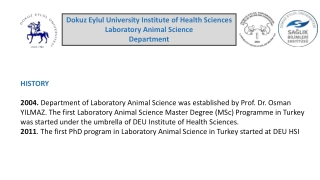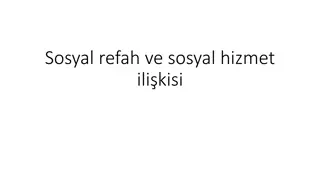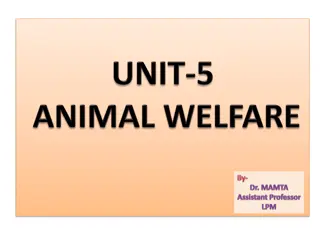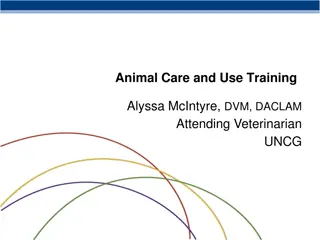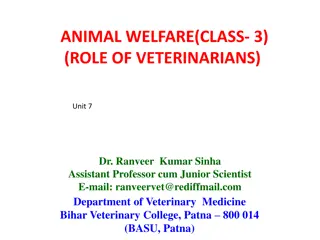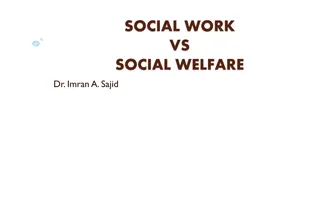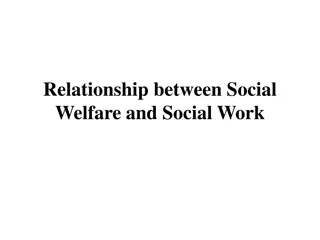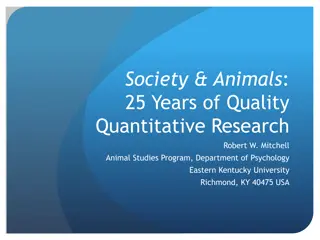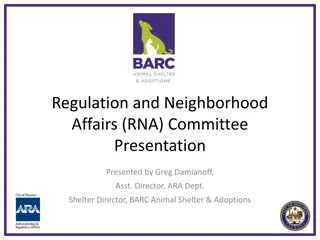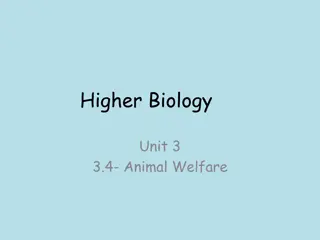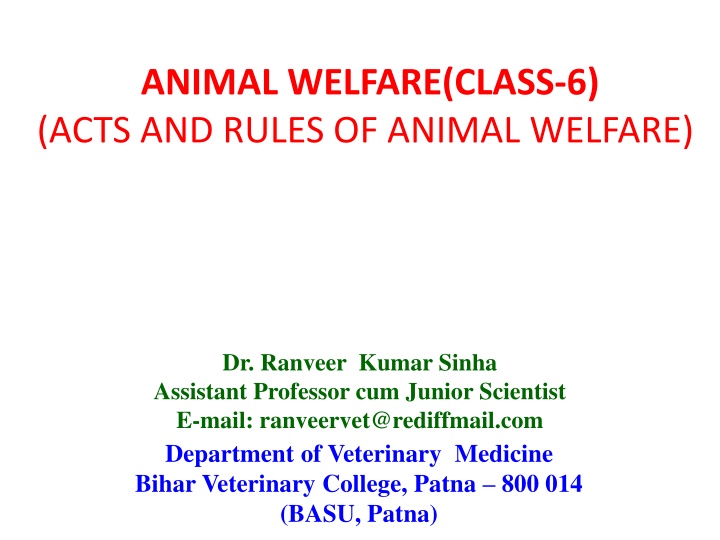
Animal Welfare Laws: Slaughter House Regulations and Animal Slaughtering Rules
Learn about the acts and rules related to animal welfare, including regulations governing slaughterhouses and animal slaughtering practices. Discover the legal provisions for licensed premises, conditions for slaughtering animals, and restrictions on slaughtering pregnant animals or those with offspring. Understand where slaughtering is permitted and the importance of following government and municipal laws for animal welfare.
Download Presentation

Please find below an Image/Link to download the presentation.
The content on the website is provided AS IS for your information and personal use only. It may not be sold, licensed, or shared on other websites without obtaining consent from the author. If you encounter any issues during the download, it is possible that the publisher has removed the file from their server.
You are allowed to download the files provided on this website for personal or commercial use, subject to the condition that they are used lawfully. All files are the property of their respective owners.
The content on the website is provided AS IS for your information and personal use only. It may not be sold, licensed, or shared on other websites without obtaining consent from the author.
E N D
Presentation Transcript
ANIMAL WELFARE(CLASS-6) (ACTS AND RULES OF ANIMAL WELFARE) Dr. Ranveer Kumar Sinha Assistant Professor cum Junior Scientist E-mail: ranveervet@rediffmail.com Department of Veterinary Medicine Bihar Veterinary College, Patna 800 014 (BASU, Patna)
ACTS AND RULES OF ANIMAL WELFARE The Prevention of Cruelty to Draught and Pack Animals Rules, 1965 The Prevention of Cruelty to Animals (Licensing of Farriers) Rules, 1965 The Performing Animals Rules, 1973 The Transport of Animals, Rules 1978 The Prevention of Cruelty to Animals (Application of Fines) Rules, 1978 The Prevention of Cruelty to Animals (Registration of Cattle Premises) Rules, 1978 The Prevention of Cruelty (Capture of Animals) Rules, 1972
THE PREVENTION OF CRUELTY TO ANIMALS( SLAUGHTER HOUSE) RULES,2001 What does law provides with respect to the slaughtering houses? Section 2(c) of the above mentioned Act defines slaughter house wherein 10 or more than 10 animals are slaughtered per day Duly licensed or recognized under a Central, State or Provincial Act or any rules or regulations made there under.
What is the law regarding the slaughtering of animals? Section 3(1) of the above mentioned Act provides that animals cannot be slaughtered except in the recognized and licensed houses. Section 3(2), prohibits slaughtering of any animal which is pregnant or has an offspring less than three months old, or the animal which is under the age of three months or has not been certified by a veterinary doctor that it is in a fit condition to be slaughtered.
Is slaughtering of animal apart from the slaughter house forbidden? Wherever there is a Government slaughter-house, the slaughter cannot be done anywhere else. If there is no government slaughter house in that area then killing can only take place in licenced slaughter houses which should be situated where they are not public nusisance and an environmental hazard. These slaughterhouses have to follow the Municipal Corporation laws and the ISI regulations. Lambs or any other animals cannot be slaughtered in slums, in roadside ramshackle meat shops or in dhabas or in private houses.
Is it crime to sell camels meat? Camel s meat is not notified item of food, as per the provisions of the prevention of cruelty to animals act,1960. Presently, provision is available, only for slaughtering cattle, goat, sheep and pig, within the Corporation limits. The license to sell beef will not enable the sale of camel s meat.
What does the law says regarding the conducting of experiments on animals? Section 4 of the Experiments on Animals ( Control and Supervision ) Rules, 1968 lays down certain conditions regarding the conducting of experiments which are as follows : 1. Experiments should be performed with due care and humanity 3. Minimum number of animals shall be used in an experiment 4. Experiments involving operative procedure more severe than simple inoculation or superficial venesection shall be performed under the influence of anaesthetic of sufficient power to prevent the animal feeling pain 5. The experiment shall not be performed for the purpose of attaining or retaining manual skill. 6. Experiment shall not be performed by way of an illustration of lecture in schools or colleges 7. Experiments shall not be performed as a public demonstration except for advancement of knowledge 8. The substance known as Urari or Curari or any such paralysant shall not be used or administered for the purpose of any experiment except in conjunction with anaesthetic of sufficient depth to produce loss of consciousness
Is it illegal to sell animals for experiments? Yes, it is illegal to sale animals for experiments. Section 4A of The Experiments on Animals ( control and Supervision) puts restriction on sale of animals for experiments. It says that no officer, employee or agent of any animal-control authority shall transfer, trade, supply or otherwise provide any animal coming into his or her possession to any animal dealer, commercial kennel, educational institution or other person for the use in research, product education, biological production or other scientific, biomedical or veterinary purposes. pet shop, laboratory, development testing,
COMMITTEE FOR THE PURPOSE OF CONTROL AND SUPERVISION ON EXPERIMENTS ON ANIMALS(CPCSEA). CPCSEA has been constituted by the Government of India, under Sections 14 to Chapter IV of the Prevention of Cruelty to animals Act, 1960, for the purpose of controlling and supervising experiments performed on animals.
Duty of CPCSEA It is the duty of the committee to take all such measures as may be necessary to ensure that the animals are not subjected to unnecessary pain or suffering, before, during or after the performance of experiments on them. To achieve this purpose, the CPCSEA may, through notification in the Gazette of India, make such rules as it may think fit in relation to the conduct of such experiments. The CPCSEA will : Register institutions/establishments/breeders carrying out experiments on animals/breeding animals. Ensure that the experiments are carried out by qualified individuals and with full responsibility of the person in charge of the institution. Monitor and inspect the housing of animals of breeders/establishments and ensure that it is as per specified standards. Participate in the meetings of the Institutional Animal Ethics Committees. Ensure that experiments are performed with due care and humanity and that as far as possible experiments involving invasive procedures/surgery are performed under the influence of some anaesthetic of sufficient power to prevent the animals feeling pain.
Duty of CPCSEA Ensure that experiments on animals are avoided whenever it is possible to do so and propagate the principles of 3 R that is to REDUCE, REDEFINE, and REPLACE the use of animals in experiments. Ensure that as far as possible experiments are not performed merely for the purpose of acquiring manual skill Ensure that the animals intended for the performance of the experiments are properly looked after both before and after experiments Ensure that required records are maintained with respect to experiments performed on animals.

